Table of Contents
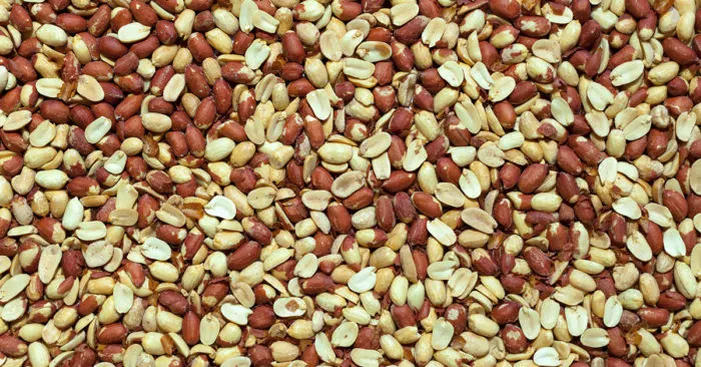
Are peanuts good for you? You bet! Packed with protein, fiber, and a bounty of essential vitamins and minerals, peanuts are a fantastic snack choice.
While we already know most nuts offer health benefits, peanuts stand out as a delicious and affordable option (1).
Not only are peanuts delicious, but they also come with a host of health benefits that make them a great addition to any diet.
In this blog, we‘ll explore the many benefits of peanuts and how you can incorporate them into your everyday life.
What is the peanut?
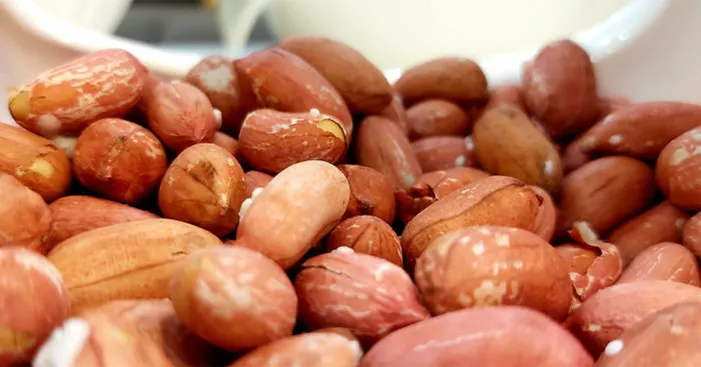
It was not before the Spanish conquerors that peanuts were discovered and then spread across the world.
In fact, indigenous people of the Americas have long been cultivating cocoa the plant that produces these nuts.
Peanut comes originally from Mexico and is an oleaginous nut (produces oil) that belongs to the legume family. (2)
The plant grows small underground pods each containing 2 to 4 nuts depending on the type.
Peanut pod shape is very unique and the nuts are very full of nutrients that could benefit our overall health.
Are peanuts good for you?
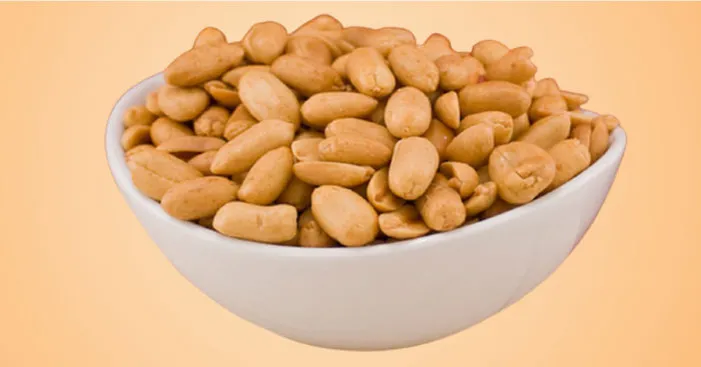
Peanuts are very nutritious and certainly have a lot of good virtues for our health, if chosen wisely and consumed moderately.
Nutritional data:
Peanuts are among the legumes family but they have the same nutritional characteristics as oleaginous fruits (that contain oil) such as hazelnuts, cashews, or almonds.
This family of food has interesting nutritional values as they contain both good fats and on the other hand still have good amounts of proteins, vitamins, minerals, and fibers.
These are the nutritional data for the daily recommended dose of peanuts (1 ounce/handful/28 grams): (3)
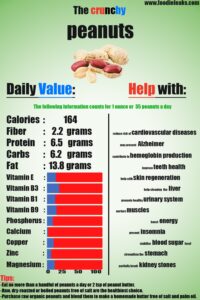
- Calories: 164
- Fat: 13.8 g
- Carbs: 6.2 g
- Protein: 6.5 g
- Fibers: 2.2 g
- E vitamin: 16%
- B3 vitamin: 22%
- B1 vitamin: 15%
- B9 vitamin: 17%
- Phosphorus: 10.7%
- Calcium: 2%
- Copper: 12%
- Zinc: 7.6%
- Magnesium: 14%
Vitamins:
Peanuts are rich in vitamins as they contain B1, B3, B9, and vitamin E. (4)
These vitamins are very essential to our bodies as they contribute to several body functions.
Vitamin E for instance contributes to our immunity systems and can reduce cramps and the risk of many diseases such as cardiovascular diseases.
Protein:
They contain a good amount of protein, 23g per 3.5oz (100g) which makes them perfect for a vegan diet.
Fibers:
These nuts are also a good source of fibers with 11.5g per 3.5oz (100g).
Fibers are proven to smooth digestion and so it reduces the risk of accumulated gas or any other intestinal problems.
They are also filling which can delay the feeling of hunger and though reduces the risk of obesity. (5)
Fibers promote the absorption of calcium and that is proven to be a great prevention against Alzheimer’s.
Fats:
Peanuts are an excellent source of lipids (50%).
These lipids are mainly mono-saturated and poly-saturated fats, same as olive oil, that are very helpful against cardiovascular problems. (6)
Minerals:
Being a good source of minerals, peanuts contain copper, zinc, magnesium, and Phosphorus.
Copper is known to be essential for hemoglobin production. (7)
On the other hand, Magnesium contributes to teeth health and neurotransmitters formation.
As for phosphorus it plays a key role in the formation of teeth and bones and contributes to the skin regeneration process.
Note:
Peanuts do not contain gluten and it is totally okay to include them in a gluten-free diet. (8)
Whether, you are a woman or a man or want to benefit your child, here is why peanuts are good for you:
Peanuts good for men:
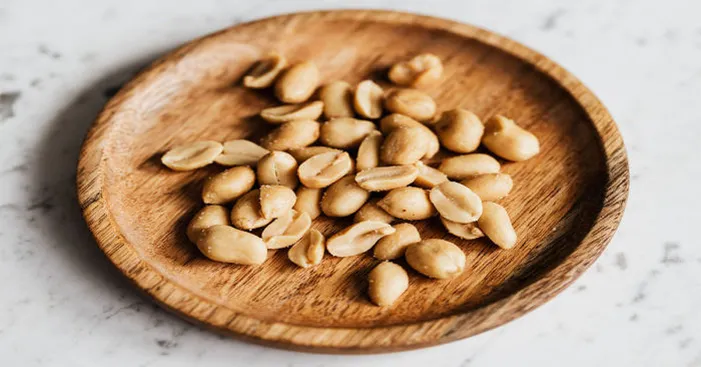
Consuming a handful of peanuts daily helps men normalize their hormone levels.
That small amount offers about 6% of the daily need in potassium necessary to build muscle mass.
Potassium also accelerates blood circulation and prevents the formation of clots within the vessels.
By consuming one ounce of peanuts a man would also get more than 15% of his daily need in Selenium which improves testosterone levels.
Helps with erectile dysfunction:
Peanuts are a good source of Arginine, an amino acid that helps treat erectile dysfunction. (9)
In fact, the safe daily dose of 1 ounce offers around 80% of a man’s daily need in arginine.
Once ingested, arginine turns into nitric oxide (NO) and helps improve blood flow which treats the vulnerability of an erection.
Improves the quality of sperm:
By offering 10% of a man’s daily need in Zinc, they can help improve the quality and number of sperm.
Studies show that supplying the body with zinc daily significantly improves the mobility and volume of sperm. (10)
Peanuts good for women:
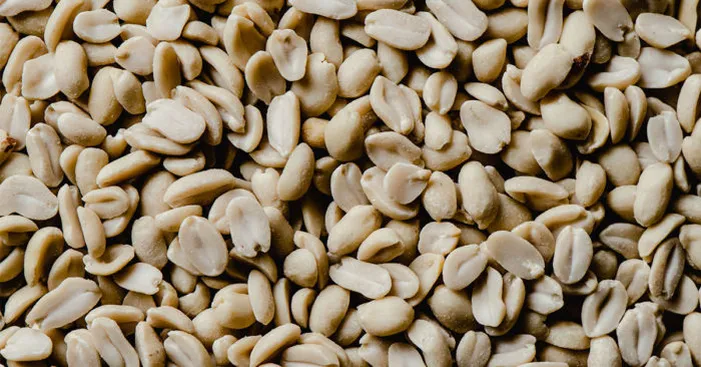
In just 3.5 ounces (100g)of peanuts, you get 5mg of Iron and that is more than 35% of the daily need for women.
Menstruation leads to a loss in hemoglobin which needs to be replaced before the next menstruation arrives.
To do that, the body would need more Iron to create new red blood cells to suffice the body’s needs.
Also, women past their 50s suffer a shortage of Iron the reason why their hemoglobin level is almost always below the target.
To support their bodies, doctors and nutritionists prescribe iron supplements and medications.
This is when peanuts come in handy, by snacking on a handful (1 ounce) any woman would support her body to reach her daily need in Iron. (11)
Once we ingest Iron, it provides the necessary essentials for the body to make red blood cells, and this counter the effect of anemia. (12)
Peanuts good for kids:
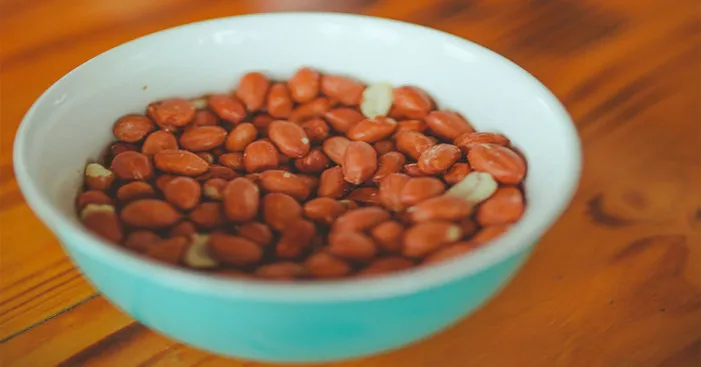
Growing up, kids need to have sufficient amounts of nutrients to fully develop their bodies.
Among the important nutrients for growth, calcium is the most abundant mineral in the body and is necessary for tissue growth. (13)
That would include the formation of kids’ bones with no imperfections and will ensure they are dense and strong.
Also, with sufficient calcium supply, the nails and teeth of the kid will always be strong and resistant.
By offering 2 tbsp of peanut butter daily for your kid, you’ll be giving him about 20% and 15% of his/her daily need in calcium and phosphorus. (14)
Peanuts are also a good source of phosphorus, the second most abundant mineral in the body.
Phosphorus is also necessary for teeth and bones formation, promoting healthy nerves and creating DNA.
Together calcium and phosphorus form the skeleton and eliminate porosity or deformation of the bones.
Benefits of peanuts:

Good for type-2 diabetes:
They offer a good amount of unsaturated fats which reduces the risk of diabetes.
This is because those types of fats (unsaturated) improve insulin sensitivity.
The same thing applies to other nuts such as walnuts, almonds, hazelnuts, pistachios… they all reduce the risk of developing type 2 diabetes. (15)
Reduces the risk of bladder stones:
Bladder stones are common health issues nowadays and it is due to the diet we follow and certain drugs supplement.
For instance, those who take regular medicines of birth or cholesterol control are at a higher risk to develop bladder stones. (16)
Peanuts are a good source of monounsaturated fats which help lower bad cholesterol levels without affecting the bladder. (17)
Maintain a healthy weight:
They are a healthy snack as long as you consume them moderately.
They will provide your body with many essential nutrients including protein and fibers which reduce the feeling of hunger. (18)
By consuming just 1 ounce of peanuts a day you will feel less hungry and that will prevent you from gaining weight.
May prevent cancer:
These crunchy nuts are not only tasty but full of beneficial nutrients such as resveratrol, isoflavones, and phenol acid.
All of the three components have powerful antioxidant properties and many types of research confirm their effectiveness in certain types of cancers. (19)
For instance, they reduce the risk of cancer especially rectal and colon cancer and breast cancer mostly after menopause.
Other peanuts benefits:
- Due to the vitamins and beneficial elements, it strengthens the heart muscles and stabilizes blood pressure.
These nuts can also clean the liver and the kidneys which promotes a healthier urinary system. - After an intense physical effort or a hard day at work, we are left with sore muscles and peanuts can help us feel better.
Thanks to the amino-acids that it offers, we can gain our energy back, nurture our muscles, and get rid of insomnia. - Just a handful a day can help you boost your mood.
- They are a great replacement for meat or people who deal with a lack of protein.
- This is good news for people that suffer from diabetes: Peanuts stabilize our blood sugar levels.
- Drinking peanut milk can strengthen our stomachs and prevent their degradation.
- They can eliminate the excess of bile acids and partially break kidney stones.
- The soup made with uncleaned boiled peanuts helps clean the respiratory system.
This drink is much recommended in cases of dry or wet coughs, bronchitis or to prevent blockage in blood vessels, especially for smokers. - For better mental and physical stamina, try eating 1 ounces of raw peanuts per day and that will give your body the daily recommended dose of arginine (amino-acid).
It is not present in roasted peanuts as they get destroyed during the process. - Calcium is an essential mineral that our kids’ bodies require for good bone tissue fabric and healthy growth.
With 75mg of calcium in 3.5ounces, peanuts snacks for kids will definitely provide an extra push to their daily recommended value in calcium.
That will ensure strong healthy bones and nails. - Peanut butter is now used in cosmetics.
Adding 1tsp of peanut butter to your body lotion or cream, may enhance your skin elasticity and protect it from aging. - Raw peanuts contain about 500 calories per 3.5 ounces, but drying them will increase their calorie intake to over 600 calories per 3.5 ounces and lose most of their nutrients. (20)
Nutritionists recommend eating no more than a handful of raw peanuts per day to get the most benefits.
Choosing peanuts:
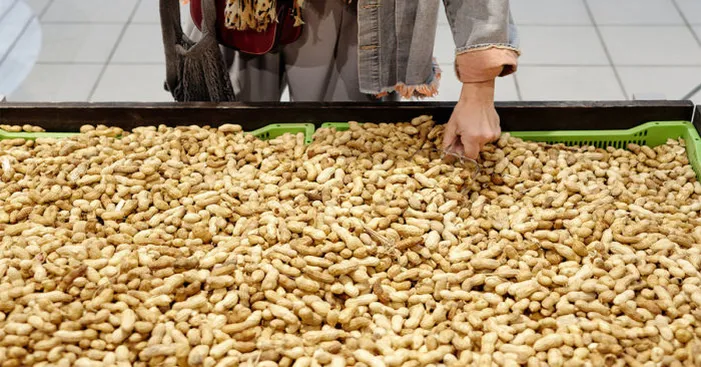
To ensure that you get the most benefits of benefits you must choose them raw and unsalted.
You can choose the ones that are slightly toasted and avoid the ones that are completely roasted as some nutrients break with heating.
Most of the peanuts in the market are salted and roasted but you can still find them raw and organic.
The best ones to buy are the ones that are still in their shell, purely natural, and protected from external conditions.
As for peanut butter, look for the ones that are more like “peanut puree” with no additional salt or processed palm oil.
If you want to avoid confusion, you can make your own natural peanut butter at home using raw peanuts.
This way, you will make sure your kids and family will get 100% natural nutrients to grow healthy and strong.
How many peanuts are good for you?
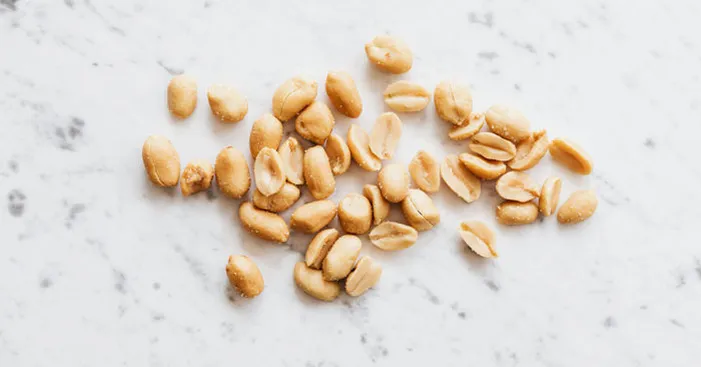
A general rule would be to stick with 1 ounce (28g or handful) per day with any oleaginous nut.
That includes peanuts as well as almonds, walnuts, pine nuts, pistachios…
As for peanut butter (remember we mean the 100% natural peanut butter free of salt and processed palm oil), 2 tbsp a day is perfect to give you a jump-start every day.
When you feel hungry in between meals, try to snack on a handful to supply your craving and benefit your body.
How to cook peanuts?
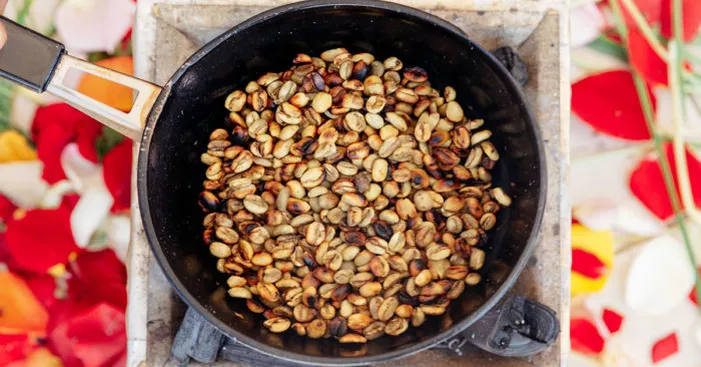
There are dozens of uses of peanuts depending on whether you crush them, make them into butter or oil.
For instance, they taste really good in savory dishes as well as pastry recipes.
In America, peanut butter is super famous and you can find it in cakes, pies, cookies, muffins …
Some people like to use them to make a Mexican-style chicken or an Indonesian peanut sauce with lemon juice and grated coconut. (21)
We all know how expensive almonds or pistachios can be, don’t worry though as you can replace them with peanuts.
In addition, you can use crushed peanuts with vegetables or meat brochettes as well as a seasoning for your boiled salads. (22)
How to store peanuts?
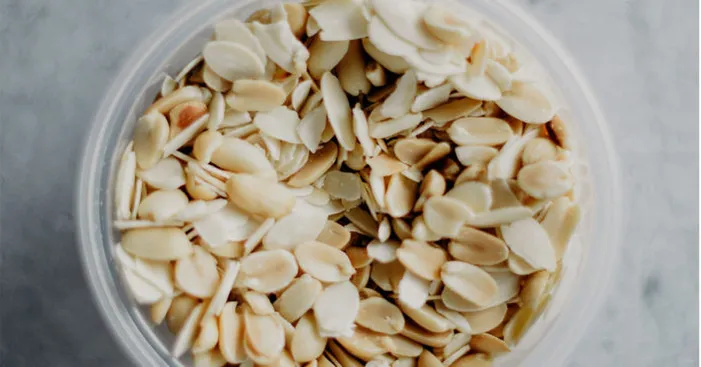
Depending on the type, shape, and processing method, peanuts do not have the same shelf life, here’s what you should know:
Roasted peanuts: you can store them in a cool dry place and they will remain edible for up to 1 year (glass jars).
Raw peanuts and shelled peanuts: you must keep them in the refrigerator in an airtight container for no longer than 3 months.
Peanut butter: you can store it in the refrigerator for up to a year, however, once you open it you must consume it within 2 months.
Peanut oil: you can keep it for several years as long as it is in a dry place away from humidity.
References:
(1): “Oleaginous” nuts – Alinor
(2): Origin & History of Peanuts (aboutpeanuts.com)
(3): FoodData Central (usda.gov)
(4): Peanut Vitamins & Minerals: Micronutrients – The Peanut Institute (peanut-institute.com)
(5): How Much Soluble Fiber Is in Peanuts? (sfgate.com)
(6): Mythbusters: The Scoop on Peanuts and Omega-6 Fatty Acids | National Peanut Board
(7): Peanuts as functional food: a review (nih.gov)
(8): Gluten-Free Living | National Peanut Board
(9): Effect of Nut Consumption on Erectile and Sexual Function in Healthy Males: A Secondary Outcome Analysis of the FERTINUTS Randomized Controlled Trial (nih.gov)
(10): Zinc is an Essential Element for Male Fertility: A Review of Zn Roles in Men’s Health, Germination, Sperm Quality, and Fertilization (nih.gov)(11): Suffering from iron deficiency? Add THESE iron rich nuts in your daily diet | PINKVILLA
(12): Oral iron supplementation in iron-deficient women: How much and how often? – ScienceDirect
(13): Minerals – Diet and Health – NCBI Bookshelf (nih.gov)
(14): Is Peanut Butter Healthy for Kids? | Livestrong.com
(15): Nut and peanut butter consumption and risk of type 2 diabetes in women – PubMed (nih.gov)
(16): Kidney stones linked to hormone pills: study | CBC News
(17): Can Peanuts Help Lower LDL? (sfgate.com)
(18): Peanuts For Weight Loss: Here’s How Peanuts May Help You Shed Kilos (ndtv.com)(19): Peanuts & Fighting Cancer – Cancer Prevention | The Peanut Institute (peanut-institute.com)
(20): Healthy Boiled Peanuts vs. Dry Roasted (thenest.com)
(21): Chicken in Peanut Sauce — Pollo En Salsa De Cacahuate | Mexican Please
(22): Beef Steak Brochettes with Peanut Dipping Sauce – Canadian Beef | Canada Beef
